ENROLL NOW: Online peacestudies for all!!! Next term July 2015!!!
TRANSCEND INTERNATIONAL’S ALL ONLINE PEACE UNIVERSITY (TPU) INVITES YOU TO ENROLL & STUDYPEACE Online
Course 1: Applied Nonviolence
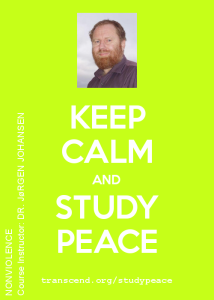 ENROLL HERE: NONVIOLENCE (for field-practitioners)
ENROLL HERE: NONVIOLENCE (for field-practitioners)
Course instructor: Dr. Jorgen Johansen visit his website here
Enroll for any of the three terms any time during the year check deadlines here!
The Gandhian concept of Nonviolence is much more than a political tool. A better description could be “a philosophy of life”. What parts of the tradition from Gandhi are of value to modern social movements of today? The nonviolent handling of conflicts will be central to the course. Articles will be distributed and must be read and used as references in the student’s papers. The aim is for students to get a solution indicative understanding of conflicts and acquire techniques of handling them nonviolently. To this end, cases of successful Nonviolent conflict-resolution will be studied – this of course is of immense value for the everyday experience both in private and professional contexts of all participants enrolled. This online seminar will also profoundly convey the practical capacity of Nonviolent means to remove authoritarian regimes at the state level.
For more Information: ENROLL HERE FOR NONVIOLENCE WITH DR. JORGEN JOHANSEN
Course 2: Conflicts at the Micro-Level
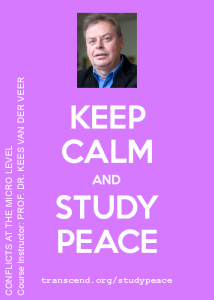
ENROLL HERE: CONFLICTS AT THE MICRO-LEVEL
Course instructor: Kees Van der Veer
Enroll for any of the three terms any time during the year check deadlines here!
Essentially, this course will deal with causes of interpersonal conflicts, with attraction and relationships, with the development of social attachments. Attitude formation and behavior will be studied in order to better understand the influence of group membership as well as processes of social influence: Conformity, Compliance and Obedience. Furthermore, hostile intergroup behavior such as Prejudice, Stereotypes, Discrimination and Aggression will be discussed together with common traits of humanity such as Altruism and other forms of Prosocial behavior. Concepts of Morality and Competition, Justice and Cooperation will also be elaborated. Content part two: The second part of the course will pay attention coping strategies and perspectives on conflict resolution in organizations. Relationships and conflicts at work and organizational power will be discussed in in view of politics and gender-factors. Culture conflicts in a cross-cultural perspective will also be discussed alongside conceptions of fairness and reconciliation.
For more Information: ENROLL HERE FOR CONFLICTS AT THE MICRO-LEVEL
Course 3: Interventions in the Aftermath of Civil Wars
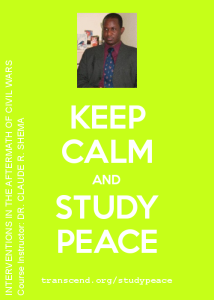
ENROLL HERE: INTERVENTIONS IN THE AFTERMATH OF CIVIL WARS
Course instructor: Dr. Claude R. Shema
Enroll for any of the three terms any time during the year check deadlines here!
The “interventions in the aftermath of civil wars-” course is tailored on fundamental strategies and approaches that are useful for reconstruction, rehabilitation and reintegration processes in war ravaged countries. The main objective of this course is to share pertinent information acquired through field experience and provide skills or useful knowledge to the learners and stakeholders , who are interested in the field of peace, rehabilitation on the ground. The course encompasses main points related to peace building in the aftermath of civil wars.
For more Information: ENROLL HERE FOR INTERVENTION IN THE AFTERMATH OF CIVIL WARS
Course 4: Methods of Analysis and Research for Peace
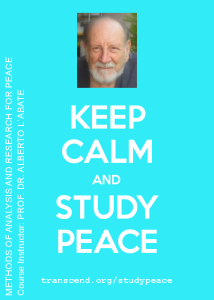 ENROLL HERE: METHODS OF ANALYSIS AND RESEARCH FOR PEACE
ENROLL HERE: METHODS OF ANALYSIS AND RESEARCH FOR PEACE
Course instructor: Prof. Dr. Alberto L’Abate
Enroll for any of the three terms any time during the year check deadlines here!
The goal of the course is for the participants to acquire creative, constructive and concrete ideas of how to carry out research which is aimed to better understand the reasons an causes of conflicts, how they can be overcome and especially how they can be prevented from escalating into violence. A special emphasis is placed on “action-research” in the field. It is a kind of research that does not end with a written report, but works towards changing a given reality in the field towards a meliorative outcome regarding humanist and humane standards. The participants at the end of the course should be able to plan and carry out research on a specific conflict, chosen by them, and should be able to produce an “action-research” programme which could , if not solve a given problem , at least enable them to de-escalate the intensity of the conflict chosen by them.
For more Information: ENROLL HERE FOR METHODS OF ANALYSIS AND RESEARCH FOR PEACE
Course 5: Democracy and Development
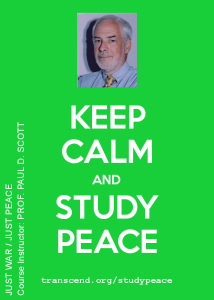
ENROLL NOW: DEMOCRACY AND DEVELOPMENT
Course instructor: Prof. Paul D. Scott
Enroll for any of the three terms any time during the year check deadlines here!
Why democracy? What is democracy? Who does development benefit? What is the nature, scope, and impact of development? What is the causal link between development and democratization? These questions challenge us at a variety of levels. All writers on political theory are confronted by the contradictions and gaps that exist in almost all states that call themselves democratic. These contradictions and gaps raise more questions than they answer.
For more Information: ENROLL HERE FOR DEMOCRACY AND DEVELOPMENT
Course 6: Just War/ Just Peace
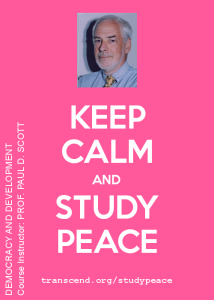
ENROLL NOW: JUST WAR/ JUST PEACE
Course instructor: Prof.Paul D. Scott
Enroll for any of the three terms any time during the year check deadlines here!
Iraq, Syria, Libya, Rwanda, Bosnia, Kosovo, Somalia, Sierra Leone, the Congo – these markers of extraordinary violence begs the question of how the international community has reacted and more importantly should respond to genocides, ethnic cleansings, politicides, and mass killings. This is a core issue in not only international law but also in the behavior of individual states and global institutions.
This course will explore the process of how not only what Responsibility to Protect is but how it has been operationalized.
For more Information: ENROLL HERE FOR JUST WAR/JUST PEACE
Course 7: Civil-Military Relations
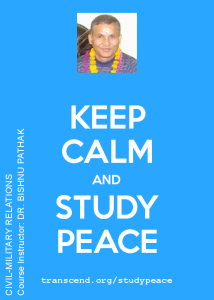
ENROLL NOW: CIVIL-MILITARY RELATIONS
Course instructor:Dr. Bishnu Pathak
Enroll for any of the three terms any time during the year check deadlines here!
The study on Civil-Military Relations (CMR) is recognized as one of the principal components of human security studies. The CMR course has been particularly designed to describe the relationship of the people and civil society as a whole with the military authority and/or its organization/s. The CMR in a democracy is based on a three-polar flying buttress, called Trinity Theory that consists of Civilian Control, Effectiveness and Efficiency.
For more Information: ENROLL HERE FOR CIVIL-MILITARY RELATIONS
Course 8: Education for Peace
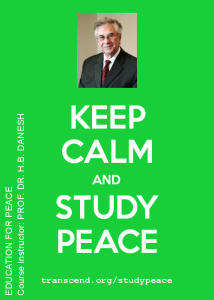
ENROLL NOW: EDUCATION FOR PEACE
Course instructor:Prof. Dr. H.B. Danesh
Enroll for any of the three terms any time during the year check deadlines here!
Education for Peace (EFP) course integrates the concept of unity, in the context of diversity, into contemporary peace education, peace-building, community development, leadership, and governance practices. This course will provide a basic introduction on the theory and practice of EFP, and explores the application of unity-centered methodologies to inter-personal, organizational, inter-group, and global contexts.
Topics covered include: concept of unity, definition and classification of worldview, the intersections of developmental psychology with peace and peace-building, theories of social change, and the skills of peace-based education and relationships in the family, school and the community.
For more Information: ENROLL HERE FOR EDUCATION FOR PEACE
Course 9: Advanced Conflict Transformation
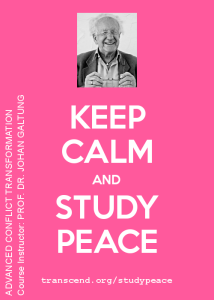
ENROLL NOW: ADVANCED CONFLICT TRANSFORMATION
Course instructor: Prof. Dr. Johan Galtung
Enroll for any of the three terms any time during the year check deadlines here!
The course, will give an insight into the method of conflict transformation (including conflict theory, conflict analysis & peace theory). By the end of the course participants should:
–recognize socio-dynamic contradictions and assess the importance of their dialectics for the diagnosis, prognosis and therapy of conflict formations. At the core of this solution oriented course on conflict transformation, concepts of violence, peace and equity will be studied at the meso (between and within groups), macro (between and within States and Nations) and mega level (between and within Civilizations).
-be able to use these concepts to evaluate the capacity of the various approaches of peace-building, peace-keeping and peace-making to solve conflicts nonviolently.
-own methods and heuristic tools which will allow them to improve their professional competencies in the field and enhance their skill-sets as conflict transformation specialists.
The course provides the necessary toolkit for analyzing conflicts and investigating pathways to solutions, through the lens of nonviolence, empathy and creativity.
For more Information: ENROLL HERE FOR ADVANCED CONFLICT TRANSFORMATION
Course 10:Social and Political Transformation in the digital age
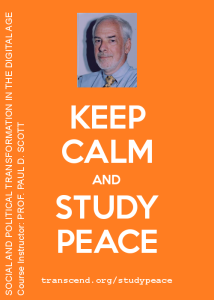
ENROLL NOW: SOCIAL AND POLITICAL TRANSFORMATION IN THE DIGITAL AGE
Course instructor: Prof.Paul D. Scott
Enroll for any of the three terms any time during the year check deadlines here!
This course examines the implications of broadcast and digital media on the social and political transformation associated with the term globalization. The course considers the critical issues raised by global information technologies and how they impact on notions of the nation as well as represent new avenues for empowerment as well as manipulation. Some of the key issues covered in the course include international media and content flow, nationalism, new media technologies, diaspora communities, and media regulation.
For more Information: ENROLL HERE FOR SOCIAL AND POLITICAL TRANSFORMATION IN THE DIGITAL AGE
Course 11: Introduction to Peacekeeping and Peacebuilding
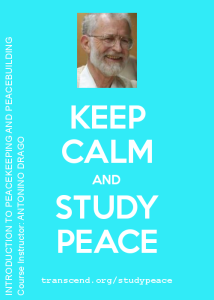
ENROLL NOW: INTRODUCTION TO PEACEKEEPING AND PEACEBUILDING
Course instructor: Antonino Drago
Enroll for any of the three terms any time during the year check deadlines here!
The course presents a grassroots viewpoint on international interventions in crisis areas. Then develops according to three political assumptions; the need to ban nuclear weapons, the need to empower the UN as the present best opportunity for a socially empowering world government, and non-violence as the most valuable motivation inside the participants to the Peace movement.
For more Information: ENROLL HERE FOR INTRODUCTION TO PEACEKEEPING AND PEACEBUILDING
Course 12: SABONA- Searching for Good Solutions – Learning Solving Conflicts
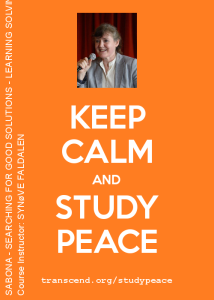
ENROLL NOW: SABONA-SEARCHING FOR GOOD SOLUTIONS-LEARNING SOLVING CONFLICTS
Course instructor: Synøve Faldalen
Enroll for any of the three terms any time during the year check deadlines here!
The course, which spans 6 weekends covering a total of 12 weeks, will give participants insight into the pedagogical method of conflict transformation in daily life in families, schools and at the workplace. SABONA is a Zulu word standing for “I See You”. In this seminar, the quintessential concept is that of EMPATHY. This course will discuss and showcase tools that allow participants to systematically recognize patterns of interaction inclined to generate constructive & legitimate thoughts and actions of reciprocity. RECIPROCITY is a central variable for conflict transformation be it within the school system or in situations of daily life. Participants will learn how to see and solve conflicts within their own couples and family, at work and generic social situations. This course helps participants understand what happens in conflicts, how conflicts can be solved and how more equitable and empathic relations of conviviality are built.
For more Information: ENROLL HERE FOR SABONA-SEARCHING FOR GOOD SOLUTIONS-LEARNING SOLVING CONFLICTS
Course 13: Peace by African Peaceful Means
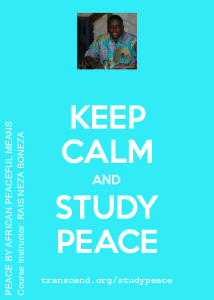
ENROLL NOW: PEACE BY AFRICAN PEACEFUL MEANS
Course instructor:Rais Neza Boneza
Enroll for any of the three terms any time during the year check deadlines here!
This course is meant to provide a greater understanding of politics, peace and conflict in African societies and regional blocks. The course also attempts to provide with Africans theoretical tools and concepts to evaluate peace building in Africa with a deep insight on African cosmologies. The course promote a creative understanding of the different interpretations, discourses and policies on history, politics, conflict and development in Africa, and their application to contemporary issues both at micro, meso and macro level and their consequences. You will acquire specific knowledge and understanding of methodologies of conflict analysis, management, resolution and peace-building with an African perspective. The participants will attempt to remedy problems of conflict and under-development facing African societies but also giving a reflection on how Africa can contribute to peace in the world.
For more Information: ENROLL HERE FOR PEACE BY AFRICAN PEACEFUL MEANS
Course 14:Nonviolent Movements
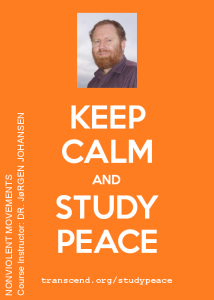
ENROLL NOW: NONVIOLENT MOVEMENTS
Course instructor:Dr. Jørgen Johansen
Enroll for any of the three terms any time during the year check deadlines here!
Nonviolent movements have frequently and successfully fought for development of basic democratic rights and freedoms all over the world. Historical cases will be studied in order to understand the present movements like Occupy, environmental-, animal rights, and peace-movements. The strategies and tactics used will be analysed and explained. How unarmed movements can win against states with armed police and military is one central part of this, but also how violence can backfire and destroy the goals. Students will be trained to use analytical tools on complex societal conflicts and suggest nonviolent actions to create awareness, build a movement, and achieve the goals.
The goal is to give the students a deep understanding of the nonviolent movements dynamic, theories to understand the complexity, and skills to start acting.
For more Information: ENROLL HERE FOR NONVIOLENT MOVEMENTS
Course 15: Economic-Development-Conflict: The Indien Experience
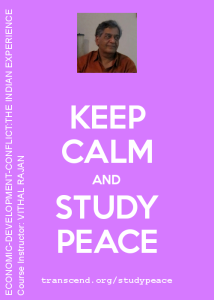
ENROLL NOW: ECONOMIC-DEVELOPMENT-CONFLICT: THE INDIAN EXPERIENCE
Course instructor: Vithal Rajan
Enroll for any of the three terms any time during the year check deadlines here!
The purpose of this course is to illuminate what has happened in India over the past century, though it was in the forefront of the struggle not only against 19th century Imperialism, but under the leadership of Mahatma Gandhi against modern, aggressive and individualistic values of exploitative societies. Gandhi was both a spiritual leader and an astute politician, and he vigorously propagated alternative pathways to a happy and contented quality of life to the prevailing Western model, for he foresaw many of our present-day problems. His vision was based on the age-old knowledge of many Eastern spiritual traditions, Hindu, Buddhist, Islamic and Christian.
For more Information: ENROLL HERE FOR ECONOMIC-DEVELOPMENT-CONFLICT: THE INDIAN EXPERIENCE
Course 16: Peace-based Leadership
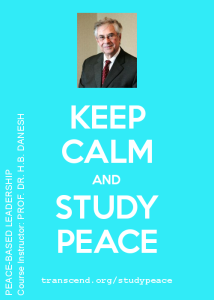
ENROLL NOW: PEACE-BASED LEADERSHIP
Course instructor: Prof. Dr. H.B. Danesh
Enroll for any of the three terms any time during the year check deadlines here!
Peace-Based Leadership (Leadership for Peace) is a conceptual and skill-based course designed to provide students with the necessary knowledge and practical skills to:
1. Diagnose various modes of leadership and governance,
2. Evaluate the salient characteristics of each of these models,
3. Determine the type of leadership most appropriate for specific circumstances,
4. Identify their own unique potentials and skills of leadership, and
5. Be able to act as effective and progressive leaders in their respective domains of activity in the context of progress and peace.
For more Information: ENROLL HERE FOR PEACE-BASED LEADERSHIP
Course 17:Security Studies: Theory of Human Security
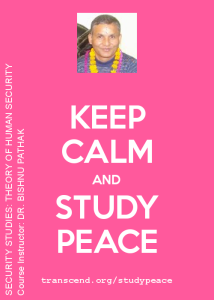
ENROLL HERE: THEORY OF HUMAN SECURITY
Course instructor: Dr. Bishnu Pathak
Enroll for any of the three terms any time during the year check deadlines here!
The purpose of this course is to illuminate what has happened in India over the past century, though it was in the forefront of the struggle not only against 19th century Imperialism but under the leadership of Mahatma Gandhi against modern, aggressive and individualistic values of exploitative societies. Gandhi was both a spiritual leader and an astute politician and he vigourously propagated alternative pathways to a happy and contented quality of life to the prevailing Western model, for he foresaw many of our present-day problems. His vision was based on the age-old knowledge of many Eastern spiritual traditions, Hindu, Buddhist, Islamic and Christian.
For more Information: https://www.transcend.org/tpu/#course_70

![[X]](/img/dialog-close.png)